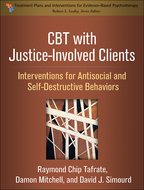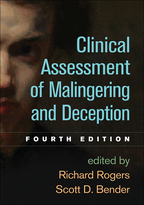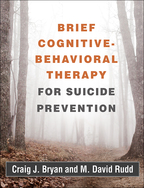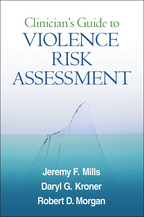CBT with Justice-Involved Clients
Interventions for Antisocial and Self-Destructive Behaviors
Raymond Chip Tafrate, Damon Mitchell, and David J. Simourd
HardcoverPaperbacke-bookprint + e-book
Hardcover
orderMay 25, 2018
ISBN 9781462534920
Price: $74.00 307 Pages
Size: 8" x 10½"
Paperback
orderMay 26, 2018
ISBN 9781462534906
Price: $49.00307 Pages
Size: 8" x 10½"
The reproducible materials can be downloaded and printed in PDF format.
“Tafrate et. al…have crafted a [book] that is easily readable and deeply practical. Good examples include the use of case vignettes throughout the text, which illustrate typical progress and struggles between the client and the clinician….The informative summaries, scripts, and handouts available for the clinician flow naturally, and will be a helpful addition to any graduate trainee working with this population. Finally, the authors do well in providing a [manual] that a clinical supervisor can easily follow and build upon as needed….[It] is a useful addition to the field of forensic treatment.”

—The Behavior Therapist
“This book does a good job of addressing an important issue in the criminal justice system. The authors give clinicians tools to deal with antisocial personality traits and criminogenic thought processes using cognitive behavioral therapy. It is a great resource which should be in the libraries of therapists working in prisons, jails, and probation offices.”

—Doody's Review Service
“This book provides an excellent introduction, planner, guide, and resource for mental health and criminal justice professionals who want to help offenders change their behavior. The authors’ approach is grounded in CBT, which is empirically proven to be the most effective intervention with this population, whether in justice-controlled settings or in the community. I highly recommend it.”

—Bruce D. Sales, PhD, JD, ScD (h.c.), Virginia L. Roberts Professor, Department of Criminal Justice, Indiana University Bloomington
“Tafrate, Mitchell, and Simourd have done a first-rate job of balancing the need for structured learning and professional discretion in this treatment planner. The book is clearly written and filled with helpful tips and practical exercises that can be used to help a wide range of justice-involved clients make prosocial changes. Students of correctional rehabilitation and staff who work with offenders, whether just beginning their career or highly experienced, will want this valuable resource on their shelves.”

—James Bonta, PhD, Director (retired), Corrections Research, Public Safety Canada; coauthor of The Psychology of Criminal Conduct
“This exceptionally well-structured guide builds on CBT to provide step-by-step information for treatment of justice-involved clients. The discussions of cognitive restructuring, motivational interviewing, risk reduction, and managing anger episodes are especially helpful. The book is jam-packed with practical examples of what to say and do, in the form of sample scripts and therapeutic responses. It is nicely suited for courses in correctional, mental health, and rehabilitation counseling, as well as for psychology and social work programs that address behavior change in the criminal justice system.”

—Stanley L. Brodsky, PhD, Professor Emeritus and Scholar in Residence, Department of Psychology, University of Alabama
“This book represents a landmark in the application of CBT principles to the problems of people involved in the criminal justice system. The authors have developed a well-formulated, scientifically based theory on the cognitive vulnerabilities to these clients’ behavioral problems. Their approach to treatment is novel, creative, and exciting. This is a 'must-read' book for all those working with such populations.”

—Raymond A. DiGiuseppe, PhD, ABPP, Department of Psychology, St. John’s University; past president, Association for Behavioral and Cognitive Therapies
“Justice-involved clients present some of the least-addressed diversity challenges in all of mental health. With impeccable clinical credentials and top research pedigrees, Tafrate et al. present a masterful integration of evidence-based practices in this book—one of those rare works that spans theoretical foundations and actionable techniques. This book would serve as an excellent text for intervention courses with a focus on community mental health and diversity. If we could get every mental health practitioner who works with justice-involved clients to read about and implement this approach, we could alter our current criminalization of mental illness.”

—Christopher M. Weaver, PhD, Associate Professor and Director, Forensic Psychology Program, Palo Alto University
“This impressive treatment planner deftly addresses the challenges and complexities of doing psychotherapeutic work in forensic contexts and provides rich tools for assessment, treatment, and practice management. It expertly guides the reader in the clinical application of CBT principles and techniques for working with the multifaceted psychological and behavioral problems of clients in various sectors of the justice system. The book is filled with case examples, offers scripts throughout that are easily adapted for personal use, and contains marvelous reproducible worksheets to assist in treatment planning, as well as 'helpsheets' to boost clients' self-monitoring skills and facilitate therapeutic change in goals, cognitions, and behaviors. Clinicians learn strategies for integrating case formulation with judgments about risk and identifying treatment targets across criminal risk domains.”

—Raymond W. Novaco, PhD, Department of Psychology and Social Behavior, University of California, Irvine
“This book is innovative, extremely informative, and chock-full of exercises, scripts, and clear advice on the 'whats' and 'hows' of treatment planning and implementation. The authors are to be commended for their evidence-based conceptualization of high-risk clients that many consider to be the most difficult to reach. Beginning with forensic basics and relevant techniques of motivational interviewing, readers are shown how to help clients identify their values and enter into the process of change. The authors recommend ways to deal with realities such as clients who cling to criminogenic thought patterns, have poor employment prospects, or lack prosocial friends or family. This program offers real hope of effective behavioral change, brighter futures for clients, and a safer world for us all. This is an essential text for any graduate-level practicum placement that serves justice-involved and at-risk juveniles or adults, and a great resource for experienced CBT therapists.”

—Denise D. Davis, PhD, Department of Psychology, Vanderbilt University
—The Behavior Therapist
“This book does a good job of addressing an important issue in the criminal justice system. The authors give clinicians tools to deal with antisocial personality traits and criminogenic thought processes using cognitive behavioral therapy. It is a great resource which should be in the libraries of therapists working in prisons, jails, and probation offices.”
—Doody's Review Service
“This book provides an excellent introduction, planner, guide, and resource for mental health and criminal justice professionals who want to help offenders change their behavior. The authors’ approach is grounded in CBT, which is empirically proven to be the most effective intervention with this population, whether in justice-controlled settings or in the community. I highly recommend it.”
—Bruce D. Sales, PhD, JD, ScD (h.c.), Virginia L. Roberts Professor, Department of Criminal Justice, Indiana University Bloomington
“Tafrate, Mitchell, and Simourd have done a first-rate job of balancing the need for structured learning and professional discretion in this treatment planner. The book is clearly written and filled with helpful tips and practical exercises that can be used to help a wide range of justice-involved clients make prosocial changes. Students of correctional rehabilitation and staff who work with offenders, whether just beginning their career or highly experienced, will want this valuable resource on their shelves.”
—James Bonta, PhD, Director (retired), Corrections Research, Public Safety Canada; coauthor of The Psychology of Criminal Conduct
“This exceptionally well-structured guide builds on CBT to provide step-by-step information for treatment of justice-involved clients. The discussions of cognitive restructuring, motivational interviewing, risk reduction, and managing anger episodes are especially helpful. The book is jam-packed with practical examples of what to say and do, in the form of sample scripts and therapeutic responses. It is nicely suited for courses in correctional, mental health, and rehabilitation counseling, as well as for psychology and social work programs that address behavior change in the criminal justice system.”
—Stanley L. Brodsky, PhD, Professor Emeritus and Scholar in Residence, Department of Psychology, University of Alabama
“This book represents a landmark in the application of CBT principles to the problems of people involved in the criminal justice system. The authors have developed a well-formulated, scientifically based theory on the cognitive vulnerabilities to these clients’ behavioral problems. Their approach to treatment is novel, creative, and exciting. This is a 'must-read' book for all those working with such populations.”
—Raymond A. DiGiuseppe, PhD, ABPP, Department of Psychology, St. John’s University; past president, Association for Behavioral and Cognitive Therapies
“Justice-involved clients present some of the least-addressed diversity challenges in all of mental health. With impeccable clinical credentials and top research pedigrees, Tafrate et al. present a masterful integration of evidence-based practices in this book—one of those rare works that spans theoretical foundations and actionable techniques. This book would serve as an excellent text for intervention courses with a focus on community mental health and diversity. If we could get every mental health practitioner who works with justice-involved clients to read about and implement this approach, we could alter our current criminalization of mental illness.”
—Christopher M. Weaver, PhD, Associate Professor and Director, Forensic Psychology Program, Palo Alto University
“This impressive treatment planner deftly addresses the challenges and complexities of doing psychotherapeutic work in forensic contexts and provides rich tools for assessment, treatment, and practice management. It expertly guides the reader in the clinical application of CBT principles and techniques for working with the multifaceted psychological and behavioral problems of clients in various sectors of the justice system. The book is filled with case examples, offers scripts throughout that are easily adapted for personal use, and contains marvelous reproducible worksheets to assist in treatment planning, as well as 'helpsheets' to boost clients' self-monitoring skills and facilitate therapeutic change in goals, cognitions, and behaviors. Clinicians learn strategies for integrating case formulation with judgments about risk and identifying treatment targets across criminal risk domains.”
—Raymond W. Novaco, PhD, Department of Psychology and Social Behavior, University of California, Irvine
“This book is innovative, extremely informative, and chock-full of exercises, scripts, and clear advice on the 'whats' and 'hows' of treatment planning and implementation. The authors are to be commended for their evidence-based conceptualization of high-risk clients that many consider to be the most difficult to reach. Beginning with forensic basics and relevant techniques of motivational interviewing, readers are shown how to help clients identify their values and enter into the process of change. The authors recommend ways to deal with realities such as clients who cling to criminogenic thought patterns, have poor employment prospects, or lack prosocial friends or family. This program offers real hope of effective behavioral change, brighter futures for clients, and a safer world for us all. This is an essential text for any graduate-level practicum placement that serves justice-involved and at-risk juveniles or adults, and a great resource for experienced CBT therapists.”
—Denise D. Davis, PhD, Department of Psychology, Vanderbilt University













